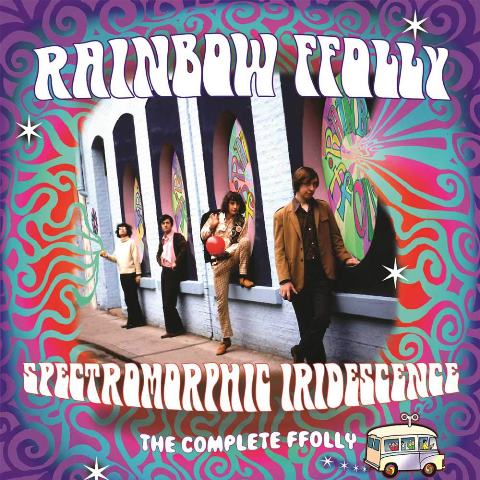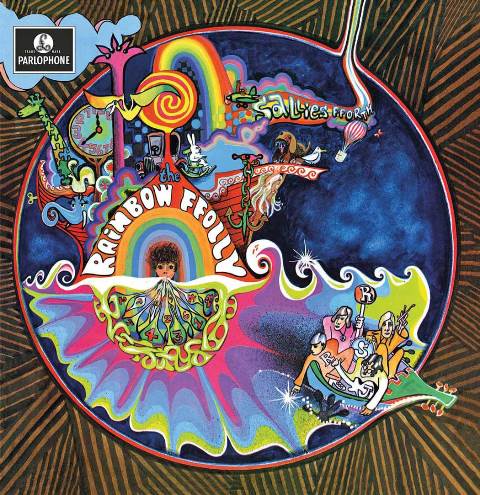Reissue CDs Weekly: Rainbow Ffolly | reviews, news & interviews
Reissue CDs Weekly: Rainbow Ffolly
Reissue CDs Weekly: Rainbow Ffolly
Box set hung around the whimsical British Sixties pop gem ‘Sallies Fforth’

Learning that your band’s demos are being issued as an album must be infuriating. Add to that the discovery that the deal to release the LP was made without your knowledge. Then, there was the further surprise that the record was to be released by Parlophone, The Beatles’ label.
This is what happened to the unwitting High Wycombe quartet Rainbow Ffolly, whose sole album Sallies Fforth was issued in May 1968. Released in mono and stereo editions, it can’t have sold well despite being promoted and properly distributed. Its rarity is attested to by first pressings fetching at least £150 but more typically £750 to £1200. Such prices are higher than a comparable period piece like the Five Day Week Straw People album but much less than Forever Amber’s The Love Cycle. But those two were, respectively, on a small label and self-pressed so were more likely to have slipped through the pop-cultural cracks. In contrast, Sallies Fforth came out on a subsidiary of corporate behemoth EMI.
 The rarity has fuelled a small Sallies Fforth industry. The album was first reissued on CD in 1998 and at least twice subsequently. There have been – counterfeit and legal – three vinyl re-editions. Now, the three-CD box set Spectromorphic Iridescence – The Complete Ffolly joins the throng. It must be the last word on Rainbow Ffolly, who issued just the one album and one single
The rarity has fuelled a small Sallies Fforth industry. The album was first reissued on CD in 1998 and at least twice subsequently. There have been – counterfeit and legal – three vinyl re-editions. Now, the three-CD box set Spectromorphic Iridescence – The Complete Ffolly joins the throng. It must be the last word on Rainbow Ffolly, who issued just the one album and one single
Discs One and Two of Spectromorphic Iridescence collect the stereo and mono versions of Sallies Fforth. Each disc is supplemented by bonus tracks: alternate single versions, previously unissued demos and recordings made for hospital radio. The third disc is a reissue of the 2016 reunion album Ffollow Up! which is bulked out by tracks recorded at the time but not issued. The band’s story is told in a 20-page booklet.
Setting aside the overkill Spectromorphic Iridescence represents, Sallies Fforth is wonderful. It is one of Britain’s best examples of whimsical, psychedelic-influenced pop. Each track is linked by radio-style jingles and sound effects: a similar approach to December 1967’s The Who Sell Out and Small Faces’ Ogdens' Nut Gone Flake (which was issued a couple of weeks after Sallies Fforth). The album’s song styles are diverse but capture a distinctive identity. It is as if The Bonzo Dog Doo-Dah Band were a straight, albeit still humour-laced, pop group which loved the zany side of The Beatles, The Beach Boys, Byrds, pirate radio’s daftness and, to a small degree, The Zombies. But whatever its merits and despite its on-trend sleeve Sallies Fforth (pictured below left) attracted little attention contemporary to its release.
 Irrespective of the minimal sales action, Rainbow Ffolly were active. They regularly recorded at a studio in Rickmansworth and it was through this connection they ended up on Parlophone. After Sallies Fforth was released, they often played London. EMI were on board, and promoted them with press ads and a special display for the album at Oxford Street’s HMV shop. A marvellous single (a different mix of an album track) was also issued. The band were featured on Radio One’s Saturday Club. They went to Germany in September 1968 to play Hamburg’s Star Club. After that, there was a two-week residency at London’s Playboy Club. But without sales, Rainbow Ffolly’s lifespan was limited. They split in 1969.
Irrespective of the minimal sales action, Rainbow Ffolly were active. They regularly recorded at a studio in Rickmansworth and it was through this connection they ended up on Parlophone. After Sallies Fforth was released, they often played London. EMI were on board, and promoted them with press ads and a special display for the album at Oxford Street’s HMV shop. A marvellous single (a different mix of an album track) was also issued. The band were featured on Radio One’s Saturday Club. They went to Germany in September 1968 to play Hamburg’s Star Club. After that, there was a two-week residency at London’s Playboy Club. But without sales, Rainbow Ffolly’s lifespan was limited. They split in 1969.
The belated postscript is heard through Disc Three’s rather forced and thin reunion album. However, the raw essence of prime-time Rainbow Ffolly at their most spontaneous is captured by the demos heard on Disc Two. Best of all is an irreverent “Lucy in the Sky With Diamonds” on which a conventional instrumental backing is overlain by bizarre, squeaky Chipmunks vocals. A straight version of “The Bells of Rhymney” attests to their assurance as a live band. It’s clear Rainbow Ffolly could have done anything – at least musically – they fancied.
Yet they hit a buffer, swiftly became obscure and remained as such until the Eighties, when collectors began propagating their slim discography. While Spectromorphic Iridescence – The Complete Ffolly overeggs the Rainbow Ffolly pudding, its core constituents – the stereo version of Sallies Fforth, the single, the demos and its telling of the full story – make the case that this was a band which should have been widely heard. It didn’t happen then, but it can now.
- Next week: Kankyō Ongaku – Japanese ambient, environmental and new age music are put under the microscope
- Read more reissue reviews on theartsdesk
- Kieron Tyler’s website
Explore topics
Share this article
The future of Arts Journalism
You can stop theartsdesk.com closing!
We urgently need financing to survive. Our fundraising drive has thus far raised £49,000 but we need to reach £100,000 or we will be forced to close. Please contribute here: https://gofund.me/c3f6033d
And if you can forward this information to anyone who might assist, we’d be grateful.

Subscribe to theartsdesk.com
Thank you for continuing to read our work on theartsdesk.com. For unlimited access to every article in its entirety, including our archive of more than 15,000 pieces, we're asking for £5 per month or £40 per year. We feel it's a very good deal, and hope you do too.
To take a subscription now simply click here.
And if you're looking for that extra gift for a friend or family member, why not treat them to a theartsdesk.com gift subscription?
more New music
 Album: Tom Grennan - Everywhere I Went Led Me To Where I Didn't Want To Be
British pop star's fourth exhibits ultra-pop oomph with mixed results
Album: Tom Grennan - Everywhere I Went Led Me To Where I Didn't Want To Be
British pop star's fourth exhibits ultra-pop oomph with mixed results
 Album: Emma Smith - Bitter Orange
The award-winning jazz singer brings new life to some classic standards
Album: Emma Smith - Bitter Orange
The award-winning jazz singer brings new life to some classic standards
 BBC Proms: Anoushka Shankar 'Chapters' review - somehow, it worked
Shankar's starry presence brings focus to this orchestral version
BBC Proms: Anoushka Shankar 'Chapters' review - somehow, it worked
Shankar's starry presence brings focus to this orchestral version
 Album: Marissa Nadler - New Radiations
The Nashville-based singer-songwriter explores disconnection
Album: Marissa Nadler - New Radiations
The Nashville-based singer-songwriter explores disconnection
 Album: Rise Against - Ricochet
Have the US punk veterans finally run out of road?
Album: Rise Against - Ricochet
Have the US punk veterans finally run out of road?
 Music Reissues Weekly: The Final Solution - Just Like Gold
Despite their idiotic name, these San Francisco psychedelic pioneers sounded astonishing
Music Reissues Weekly: The Final Solution - Just Like Gold
Despite their idiotic name, these San Francisco psychedelic pioneers sounded astonishing
 Mogwai / Lankum, South Facing Festival review - rich atmospheres in a south London field
Two polished performances and an embarrassment of instruments
Mogwai / Lankum, South Facing Festival review - rich atmospheres in a south London field
Two polished performances and an embarrassment of instruments
 Album: Alison Goldfrapp - Flux
The synth diva in her comfort zone - maybe getting a little too comfortable, though
Album: Alison Goldfrapp - Flux
The synth diva in her comfort zone - maybe getting a little too comfortable, though
 Album: The Black Keys - No Rain, No Flowers
Ohio rockers' 13th album improves on recent material, but still below mainstream peak
Album: The Black Keys - No Rain, No Flowers
Ohio rockers' 13th album improves on recent material, but still below mainstream peak
 Wilderness Festival 2025 review - seriously delirious escapism
A curated collision of highbrow hedonism, surreal silliness and soulful connection
Wilderness Festival 2025 review - seriously delirious escapism
A curated collision of highbrow hedonism, surreal silliness and soulful connection
 Album: Ethel Cain - Willoughby Tucker, I'll Always Love You
Relatively straightforward songs from the Southern Gothic star - with the emphasis on 'relatively'
Album: Ethel Cain - Willoughby Tucker, I'll Always Love You
Relatively straightforward songs from the Southern Gothic star - with the emphasis on 'relatively'
 Album: Black Honey - Soak
South Coast band return with another set of catchy, confident indie-rockin'
Album: Black Honey - Soak
South Coast band return with another set of catchy, confident indie-rockin'

Add comment